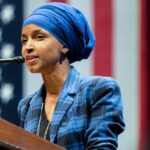

President Donald Trump announced a delay in the implementation of tariffs on imports from Canada and Mexico until February according to a report from Newsmax.
This decision follows closely on the heels of his inauguration and is part of a strategic plan to manage and reform trade agreements and tariffs. Trump, who had promised significant changes to trade policies during his campaign, revealed his intention to impose a 25% tariff on imports from Canada and Mexico.
The new tariffs are set to become effective beginning February 1st, making a strong statement on his commitment to revise trade dynamics with neighboring countries.
The announcement was unexpected for many, as it introduces potential changes to established trade practices. President Trump emphasized that the tariffs reflect a broader objective to re-balance the United States' trade relationships.
"We're thinking in terms of 25% on Mexico and Canada because they're allowing vast numbers of people," Trump explained, hinting at a complex interrelation of trade and immigration policies.
Trump has made plain his intentions to reshape America's ties with trading partners, not just regionally but globally. His earlier pronouncements during the campaign included prospective tariffs of 60% on goods from China and up to 20% on other international imports. His current decisions signal a fulfillment of those campaign promises, setting the tone for his presidency's early days.
To manage this ambitious overhaul of trade duties, Trump has initiated the creation of a new governmental organization.
The External Revenue Service (ERS) is slated to oversee and manage tariffs and duties on foreign imports, streamlining how these financial regulations are implemented and monitored under the new policy structure.
Within the framework of these adjustments, the ERS represents a notable development, signaling a dedicated focus on external revenue sources. It's an integral part of Trump's signed "America First Trade Policy," which aims to investigate trade deficits, construct the ERS, and thoroughly review existing trade agreements that might not meet his administration’s standards.
These moves towards extensive trade management and reform represent a beyond-the-border approach to fortifying American economic interests. However, they have also introduced elements of uncertainty for some international partners.
Among those affected by these imposed changes, Mexican and Canadian leadership has begun to prepare for the potential shifts in trade relations. Mexican President Claudia Sheinbaum has already laid out a new economic framework aimed at reducing reliance on imports from China while responding to Trump's tariff proposals.
The need for adjustments is evident for Canada as well. Canadian Prime Minister Justin Trudeau acknowledged the unpredictability that Trump's steps bring to the current economic landscape.
"Donald Trump's approach does bring in uncertainty," Trudeau remarked. Despite this, he expressed readiness to adapt to any economic conditions that might arise as a result of these new policies.
This international response highlights the direct effects of Trump's economic strategies beyond American borders, signifying global implications of his trade reforms. The preparedness of neighboring countries reveals a proactive approach in addressing the challenges posed by these U.S. decisions.
As the February deadline for the tariffs approaches, both affected nations and domestic parties in the U.S. will closely scrutinize the outcome of these policies. The negotiations leading up to this deadline will likely influence the future of North American trade relations significantly.
On the domestic front, the trade policy revisions underscore a broader vision Donald Trump has for the U.S. economy.
His proclamation that "Americans benefit from and deserve an America First trade policy" captures his administration's consistent focus on reinforcing America's position globally.
Supporters of Trump's strategies argue that the tariffs serve as leverage and demonstrate a hard-line stance necessary for renegotiating fair trade agreements. Critics, however, caution against the economic repercussions that these policies may entail, potentially disrupting supply chains and surfacing global trade conflicts.
Looking ahead, significant attention will fall on how this approach to tariffs and trade agreements progresses. President Trump's administration will continue to face scrutiny regarding the effectiveness and ramifications of these strategies.



